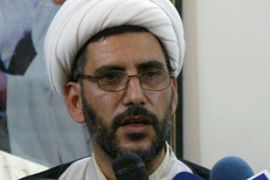Al-Sadr ‘to cut Shia alliance ties’
Faction says it is being bypassed on key decisions and is looking for new partner.

Published On 15 Sep 2007
“There are reasons for our withdrawal from the Shia alliance. The alliance has been taking decisions single-handedly without reverting to the member blocs,” he said.
Possible partner
Al-Obeidi said al-Sadr’s group was now planning to negotiate with the Fadhila party for a possible “future together”.
|
Special report |
The United Iraqi Alliance (UIA) initially comprised four key Shia factions: al-Sadr’s group, the Supreme Iraqi Islamic Council of Iraq (SIIC), the Dawa party of Nuri al-Maliki, Iraq’s prime minister, and the Fadhila party.
The UIA held 130 of the 275 seats in parliament.
However, the number dropped to 115 when the Fadhila party pulled out in March.
Al-Sadr’s bloc has 32 seats in parliament.
Sunni MP expelled
Also on Saturday, the leading Sunni Arab faction in parliament said it had expelled an MP after he rejoined the government.
The Iraqi Islamic Party, headed by Tareq al-Hashemi, the vice-president, took the action against Ali Baban, the planning minister, after he announced on Thursday that he was returning to al-Maliki’s cabinet.
Baban was among five Sunni Arab ministers and a deputy prime minister who began a boycott of the cabinet on August 1.
Iraq’s fractious government is made up of ministers from both sides of the sectarian divide but there are frequent rows between Sunni and Shia leaders and it has difficulty governing.
Vacant seats
Al-Maliki has said he will announce a cabinet reshuffle but has so far not been able to fill the vacant seats left by the withdrawal of Sunni and Shia ministers.
|
“Iraq is still under foreign occupation and Iraqis continue to die in great numbers” albaghawy, Luxembourg |
He is currently running the government with only 23 ministers out of an original 40.
In an attempt to shore up his support, al-Maliki and other Dawa leaders on August 27 signed a deal with the two Kurdish groups and SIIC under mounting pressure from Washington.
The leaders agreed to ease restrictions on former members of Saddam’s Baath party taking up government jobs, to hold provincial elections and to help the security forces to rein in sectarian unrest.
Security operation
Against this backdrop of shifting political allegiances, fighting continues to take its toll across the country.
US and Iraqi forces killed 14 suspected fighters and arrested 17 others during operations in central and northern Iraq, the US military said on Saturday.
In Baquba, 65km north of Baghdad, armed men in police uniforms and driving an ambulance killed Khalid Rasheed, a former Iraqi army brigadier-general, and two others outside his house, police said.
And in Iskandariya, 40km south of Baghdad, five Iraqi soldiers were wounded by a roadside bomb targeting their patrol on Friday.
Source: News Agencies
